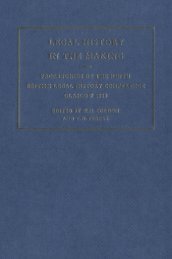130. - Collection Point® | The Total Digital Asset Management System
130. - Collection Point® | The Total Digital Asset Management System
130. - Collection Point® | The Total Digital Asset Management System
Create successful ePaper yourself
Turn your PDF publications into a flip-book with our unique Google optimized e-Paper software.
106 Structure and the Book ofZechariah<br />
probably connect this also with ptf, vv. 14-15 (also 8.3, 8; 3tf' also<br />
occurs in 1.11; 3.8; 5.7; 6.13; 7.7 [2x]; 8.4, 20-21; 9.5-6; 710.6; 11.6;<br />
12.5-8, 10; 13.1; 14.10-11), especially since both words are found in<br />
8.1-8. This, as we have already noted, has strong links with the<br />
present chapter. <strong>The</strong> words are used for the people and Yahweh<br />
respectively, except that pel is used of the people in 8.8. All the other<br />
repeated words are confined to vv. 10-17.<br />
TOD vv. 9, 12, is an important theological word, which occurs<br />
nowhere else in Zechariah. Does v. 9 help to explain the author's<br />
intention in v. 12? 1 At this stage we can only say that TOD is prima<br />
1. 'jn'ptf TOD -irw is one of the most difficult phrases to interpret in the whole of<br />
Zechariah. <strong>The</strong>re is no warrant for altering the text in the ancient versions, and certainly<br />
no agreed consensus, so we are bound to keep the MT and to try and make<br />
sense of it. <strong>The</strong> main lines of interpretation have been as follows.<br />
TIK = 'after' in a temporal sense, either as a preposition (e.g. Mitchell et al.: 'after<br />
the glory [vision] he sent me', Haggai, Zechariah, Malachi and Jonah, p. 142) or as<br />
a conjunction (e.g. Petitjean: 'Car ainsi a parle Jahve Sebaot, apres que la Gloire<br />
m'eut envoyeV He takes TCD without article or suffix to be a divine appellative,<br />
Les oracles, p. 117).<br />
Or = 'with'. So R.B.Y. Scott, 'Secondary Meanings of -irm', JTS 50 (1949),<br />
pp. 178-79; M. Dahood, 'Chiastic Breakup in Isaiah 58.7', Bib 44 (1963),<br />
pp. 292-93. This is difficult to substantiate.<br />
TOD = 'glory' meaning the divine presence, or the revelation of the divine glory to<br />
the prophet in a vision.<br />
Or = 'heaviness'. Chary (Les prophetes et le culte, p. 70) takes this sense,<br />
translating ~irm as 'with', and obtains the sense: 'with insistence he sent me'.<br />
Baldwin finds this the most convincing, but both choices are questionable, and the<br />
final result is doubly uncertain (Haggai, Zechariah, Malachi, p. 109).<br />
'jrfttf. Is the subject of the verb 'he' meaning Yahweh (as at the beginning of the<br />
verse) or is TQ3 the subject? If it is the latter, then TCD would have to stand for<br />
Yahweh in some sense: Yahweh in his glory. This would give a satisfactory<br />
meaning, especially soon after v. 9b: 'I will be in your midst for glory'.<br />
We must also ask to what expression 'to the nations' is attached. Is it "Thus said<br />
Yahweh of hosts' or 'sent me'? <strong>The</strong> latter is more natural, but if this is right, then<br />
who was sent to the nations? It could not have been Zechariah, so perhaps we should<br />
think of one of the angels. <strong>The</strong> angel who spoke with Zechariah' is a possibility in<br />
4.9b; but 6.15 seems to refer to Zechariah himself unless we take this verse to be a<br />
continuation of 6.8. All in all the latter seems to me to be the best solution.<br />
For a full discussion and list of solutions offered see Rignell, Die Nachtgesichte,<br />
pp. 84-89; Petitjean, Les oracles, pp. 109-19. See also P.R. Ackroyd, Exile and<br />
Restoration (London: SCM Press, 1968), p. 180.






